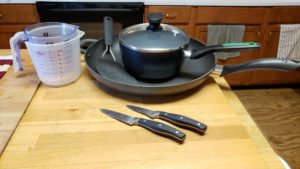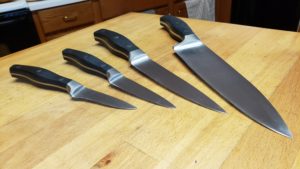
Set up your work space– Having your work space set up before you start cooking can save you a lot of time, trouble, and possibly a ruined meal. So, make sure you have all your tools, utensils, bowls, and anything else you may need set aside for quick and easy access.
Read the entire recipe first– This should be a given. By reading the recipe before you even start, you’ll be able to know what to expect every step of the way. This will also keep you from forgetting to add a certain ingredient at the correct time. It’s actually a good idea to read it a couple of times to really familiarize yourself with each step.
Recipes are only guidelines– A recipe is there to help you make a certain dish, but that does not mean that it’s the only way to make that dish. Half the fun of cooking is by trying out different ingredients to change up the overall taste. This allows you to cater to your personal preference or modify a dish to bring out certain flavors.
Ignore cooking times for the recipe– Just like recipes being guidelines, so are cooking times. Everyone’s stove, oven, pots, pans, and microwave are slightly different. So, the cooking time will change slightly for everyone. This is why it’s best to use the recipe time as a guide, but you should be the one that ultimately decides when an item is done.

Keep your knives sharp– A sharp knife just makes your life in the kitchen much easier. It allows you to quickly cut through any food with precision. If presentation is a factor in your dish, then a sharp knife will allow you to keep your cuts pristine and your dish looking like an expert chef prepared the meal. It’s also a safety tip as a dull knife could slip off the item you’re trying to cut and end up impaling you.
Prep all ingredients before cooking– Just like setting up your work space with your work tools before you start, it’s a good idea to prep all your ingredients before you start cooking as well. By prepping I don’t just mean pulling out all the ingredients. You should chop up everything you’ll need for the recipe as well as combine certain ingredients together. This will help you save time while cooking as well as make the cooking process go smoother. This is also why it helps reading the recipe beforehand.
Clean as you go– It’s good practice to either have a trashcan near by or a bowl in which you can quickly discard any scraps. Having a clean work space is a great practice and also sanitary. This tip also expands to your tools and utensils. By tossing your used tools into the sink it’ll keep you from accidentally contaminating your food.
Don’t crowd the pan– Overcrowding your pan can cause a few problems for you. The pan itself won’t distribute heat evenly which can cause you to end up cooking the food wrong. Overcrowding the pan can also cause the food to steam and cook which can then cause your food to end up flavorless and steamed instead of seared or fried.
Always taste your food before seasoning– You should always taste a little bit of your food as you’re cooking and seasoning. This will allow you to get the flavor you want just right. If you just season it without tasting it first and as you go, you might end up adding too much seasoning and ruin the dish.
Test oil– It’s a good idea to test the oil in the pan before adding all of your ingredients. In order to test the oil, you should throw a small piece of whatever you’re cooking into the pan to make sure it starts to sizzle properly before adding the rest of the ingredient. This can save an entire dish by keeping you from overcooking or burning your food.
Parchment paper can be your best friend– Parchment paper can be extremely useful that will save you a lot of time from having to clean messy pans. Anytime you have to bake something, just line your pan with some parchment paper first. After you’re done cooking all you have to do is pull that paper out and toss it into the trash. You’ll have a clean pan that won’t need a good scrubbing like you would if you didn’t use parchment paper.
Grate cold butter– If your recipe calls for butter there’s an odd trick that will end up making your dish better. First, you’ll want to place a stick of butter into the freezer until frozen. Once frozen pull it out and start grating it into a pile fast to keep it from melting before you finish. By grating your butter, it will allow you mix the butter into your dish better instead of having small pockets of butter that didn’t get mixed thoroughly. Grated butter also allows it to melt faster.
About the Author

Chris Cooke
Student - Spring 2019
I’m a Digital Media student who’s trying out journalism for the first time and almost through with the bachelor’s program and look forward to the future. I’m an optimistic kind of guy that just likes to laugh and find the fun in every situation.






